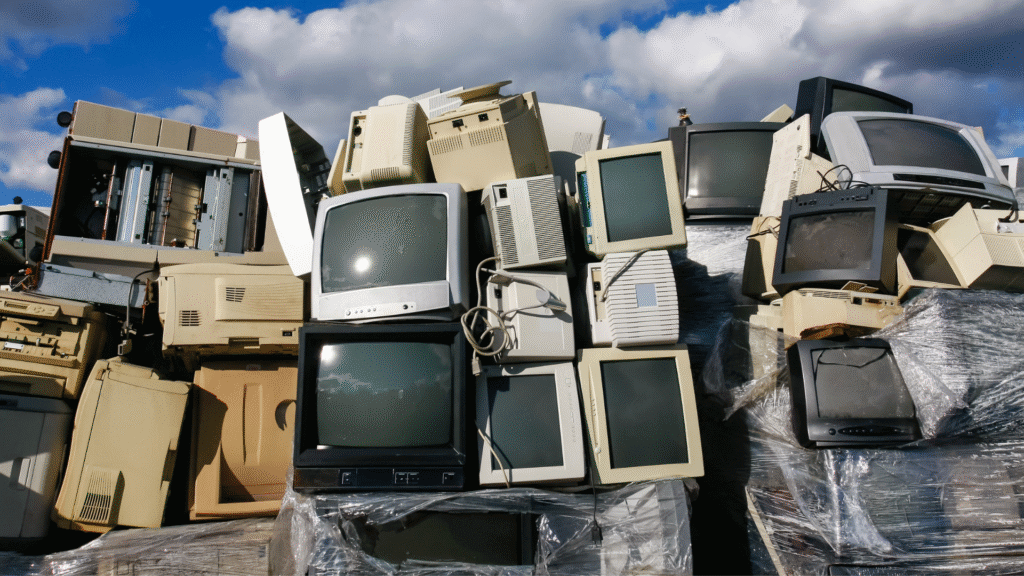What’s Inside Your Electronics?
Electronics may look harmless, but inside them are toxic materials that can harm the environment if not handled responsibly. Common hazardous materials in e-waste include:
- Mercury: Found in LCD screens and batteries, it lingers in the environment and bioaccumulates in food chains.
- Lead: Used in circuits and components, it can damage the brain, kidneys, and children’s development.
- Cadmium: Found in batteries, it can harm kidneys and bones.
- Brominated Flame Retardants: Used in plastics, these chemicals disrupt hormones and can cause cancer.
- Chromium: Found in metal housings, becomes chromium-6, a known carcinogen, when oxidized.
- Beryllium: Used in connectors, it can cause lung disease and cancer.
- PVC Plastics: When burned, they release harmful dioxins into the air.
These materials are harmful when improperly disposed of, making ethical electronics recycling essential.
How E-Waste Harms the Environment
When e-waste isn’t managed correctly, it can contaminate soil, water, and air, creating long-term problems for ecosystems and human health.
Landfill Leaks
E-waste in landfills releases toxins into the soil and water. Rainwater can carry these toxins, creating polluted runoff and contaminating groundwater. Even modern landfill liners eventually fail, allowing harmful chemicals like lead to seep into surrounding areas for decades.
Soil Pollution
Toxins from e-waste bind to soil, harming plants and animals. Crops grown in contaminated soil absorb these harmful substances, which can then enter the food chain, endangering human health.
Water Pollution
Runoff from improperly discarded e-waste pollutes rivers, lakes, and oceans. Aquatic life absorbs toxic materials, which then spread through the food chain. These substances can even make their way into drinking water, as many water treatment plants cannot remove all contaminants.
Air Pollution
Burning e-waste releases harmful gases, including dioxins and heavy metals, which pollute the air and contribute to climate change. Refrigerants in older electronics also damage the ozone layer or increase greenhouse gas emissions.
The Global E-Waste Problem
E-waste isn’t just a local issue—it’s a global crisis. Developing countries that receive discarded electronics from wealthier nations are especially at risk.
Unsafe Recycling Practices
In countries like Ghana and Nigeria, informal recycling is common. Workers burn cables to extract copper or use acid baths to recover metals, releasing toxic fumes and polluting local water sources. These unsafe methods often happen in residential areas, exposing entire communities to toxic chemicals.
Exporting E-Waste
Many companies export e-waste to developing countries where labor is cheap, and environmental regulations are weak. This not only harms local ecosystems but also raises serious ethical concerns about global environmental justice.
Examples of Environmental Damage
Guiyu, China, once the world’s largest e-waste recycling hub, is a striking example. Unsafe recycling practices left soil with lead levels 200 times higher than safe limits, and nearby rivers were too acidic to sustain life.
These issues highlight the urgent need for ethical e-waste management worldwide.
The Importance of Ethical Electronics Recycling
Not all recycling is created equal. Improper recycling can worsen environmental damage, but ethical electronics recycling offers a solution.
What Is Ethical Electronics Recycling?
Ethical recycling ensures that e-waste is processed in a way that protects both the environment and human health. This involves properly handling toxic materials, using advanced recycling technologies, and avoiding harmful practices like exporting waste to developing countries.
Certified E-Waste Processors
Choosing a certified e-waste processor, like those accredited by the e-Stewards program, ensures that your old electronics are recycled responsibly. When processors follow The e-Stewards Standard, they:
- Safely manage hazardous materials like mercury and lead.
- Use advanced technologies to recover valuable materials while minimizing pollution.
- Prohibit the export of toxic waste to developing countries.
- Undergo regular third-party audits to uphold strict environmental standards.
By using a certified e-waste processor, you can be confident that your old devices are recycled ethically.
What You Can Do
Every electronic device will eventually become e-waste. Here’s how you can reduce its environmental impact:
Recycle Responsibly
Always choose a certified e-waste processor, such as an e-Stewards processor, to ensure your electronics are disposed of safely and ethically. Certified facilities prevent harmful practices like exporting waste and prioritize environmental protection.
Extend the Life of Your Devices
The best way to reduce e-waste is to use your electronics for as long as possible. Maintain your devices, update software, and repair them when needed. If you no longer need a working device, consider donating or selling it so someone else can use it.
Support Better Policies
Advocate for stronger e-waste laws, such as extended producer responsibility programs that hold manufacturers accountable for the environmental impact of their products. Stricter regulations on hazardous waste exports can also help prevent global environmental harm.
Protecting the Planet Starts with You
E-waste is a growing environmental hazard, but it doesn’t have to be. By committing to ethical electronics recycling and becoming an e-Stewards Certified Processor, your company can help reduce pollution, protect ecosystems, and promote environmental justice.
Ready to lead the charge in responsible recycling? Learn how your business can get e-Stewards Certified and make a lasting impact on the planet.


